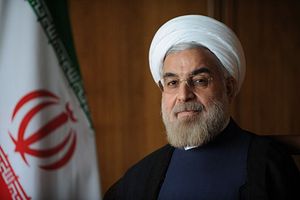It might seem that recent international events – particularly Syrian President Bashar Al-Assad’s fulfillment of his commitment to give up its chemical weapons under a Russia-US deal – has transformed the international scene. A few months ago, Iranian President Hasan Rouhani was prompted to assume a diplomatic posture of a mediator offering its “government’s readiness to help facilitate dialogue between the Syrian government and the opposition.” Since Iran has been a strong supporter of the Assad regime, it seemed presumptuous that Iran could play the role of a peacemaker in a devastating civil war.
Iran’s major challenge has been whether it can keep up its nuclear identity despite the choking economic sanctions. Some time ago, in a Washington Post op-ed piece, Rouhani brought up a point that his Holocaust-denying predecessor Mahmoud Ahmadinejad was never able to do succinctly. He said, “The centrality of (Iran’s) identity extends to the case of our peaceful nuclear energy program. To us, mastering the atomic fuel cycle and generating nuclear power is as much about diversifying our energy resources as it is about who Iranians are as a nation, our demand for dignity and respect and our consequent place in the world.” In an earlier interview with NBC, Rouhani had asserted that Iran has “never pursued or sought a nuclear bomb and we are not going to do so. We solely are looking for peaceful nuclear technology.”
It seemed to some of us that with his smiling face and reasonableness, Rouhani had opened new possibilities for dialogue and diplomacy. Consequently the rhetoric of war against Iran has become rather muffled in the U.S., though hardheaded realists wouldn’t take the Iranian leader’s word for it. The real power lies somewhere else, with the Supreme leader Ali Khamenei and the National Guard and its brutal elite branch the Quds Force, as Dexter Filkins reported in the New Yorker magazine. Israel’s Prime Minister Benjamin Netanyahu called Rouhani “a wolf in sheep’s clothing.” Israel is a very powerful factor in American foreign policy. There is some movement in Congress to slap new and tougher sanctions on Iran, which President has threatened to veto.
The Obama administration is scrambling to come up with new policy postures toward Iran, whom it continues to regard as an unfriendly country, albeit not an evil one that could provoke war and take over the region. Europeans have been reluctantly cooperating with the United States. Russia and China are back to their cozy commercial relations with Iran.
The 2007 National Intelligence Estimate (NIE) concluded “with high level of confidence” that Iran was not engaged in the development of nuclear weapons. Iran halted the nuclear weapons program in 2003, though it continues to pursue nuclear energy development for civilian energy purposes. The report said, “Our assessment that Iran halted the program in 2003 primarily in response to international pressure indicates Tehran’s decisions are guided by a cost-benefit approach rather than a rush to a weapon irrespective of the political, economic, and military costs.” Subsequent reports reaffirmed the finding that Iran was not actively engaged in nuclear weaponization program, though it has developed capacities to do so.
Of course, the national interest calculus includes both short- and long-term cost-benefit analyses. Apart from four rounds of economic sanctions imposed since 2006 by the UN Security Council that have been hurting the economy severely, Iran must have taken into account the determination of the Obama administration in supporting uprisings in Tunisia, Egypt, Libya and Syria. Iran also knows that only the U.S. can hold back Israel from bombing its nuclear facilities. Obama reaffirmed America’s engagement with the Middle East in his speech at the UN General Assembly without giving up on the pivot toward Asia.
Iran’s recent song-and-dance with the American media seems to be following the map projection given by the National Intelligence Estimate that “some combination of threats of intensified international scrutiny … and goals for regional influence in other ways, might — if perceived by Iran’s leaders as credible — prompt Tehran to extend the current halt to its nuclear weapons program.”
Iran, long isolated and under crippling sanctions, is looking for a workable strategy that would enable it to pursue nuclear research as its fundamental right as a sovereign nation and have sanctions lifted to empower its moribund economy. Iran’s sweet reasonableness, however, needs to be tested through a strict international inspection regimen.
With its enormous oil and natural gas reserves and nuclear potential, Iran is not an insignificant geopolitical power in the region. No single power should be allowed to control the Gulf region, through which millions of barrels of oil flow every day to fuel the global economy.
Last year Iran shocked India by detaining its oil tanker MT Desh Shanti in international waters, accusing it of an oil spill for which it presented no evidence. What would have been the consequences if Iran had detained a U.S. oil tanker? Or a Chinese oil tanker? Diplomacy without economic and military leverage is an exercise in futility, as India should have known. Iran knows this too well.
But the U.S. is ready to give diplomacy a chance. As Obama said on Sunday, on January 20 the clock would start ticking on a six-month deal with Iran to prevent it from enriching uranium in exchange for lifting limited amount of economic sanctions. “I have no illusions about how hard it will be to achieve this objective, but for the sake of our national security and the peace and security of the world, now is the time to give diplomacy a chance to succeed.”
Yet behind this pious diplomatic hope is Obama’s resolve never to allow Iran to develop the means to make a nuclear weapon. In the meantime, Israel waits in readiness.
Dr. Batra is author of The First Freedoms and America’s Culture of Innovation (Rowman & Littlefield, 2013) and a professor of communication and diplomacy at Norwich University.

































